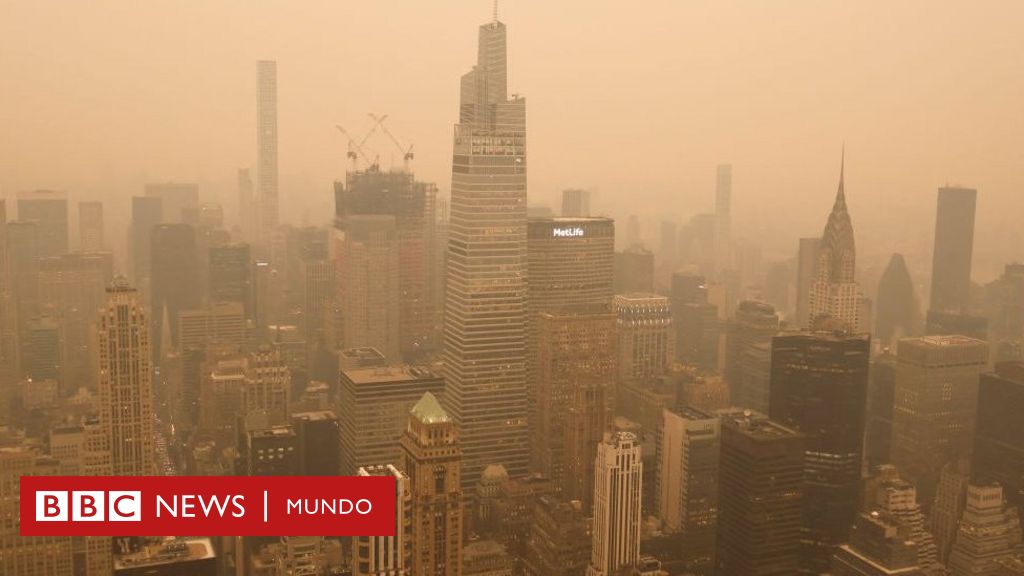- Nadine Yousif in Toronto and Sam Cabral in Washington
- BBC
image source, Getty Images
The look of New York this Wednesday.
Some 100 million people in North America are facing dangerous levels of air quality as the intense wildfires ripping through Canada spread.
Smoke blanketed large areas of Ontario and Quebec, while an orange haze billowed across much of the northeastern United States through Tuesday and Wednesday.
Toronto and New York joined the list of metropolitan areas with the worst air quality in the world for hours.
Las New York public schools canceled all outdoor activities and the city’s mayor asked citizens to limit their activities abroad.
Much of the smoke comes from Quebec, where are registered at least 160 fires.
Canadian authorities say the country is bracing for the worst wildfire season on record.
image source, BBC
Experts point out that a warmer and drier than normal spring explains the fires. These conditions are expected to continue throughout the summer.
Canada’s weather service issued its strongest air quality warning for Ottawa on Tuesday, calling it a “very high risk” to people’s health.
Deteriorating air quality has also forced at least one region of Quebec, the Atikamekw community of Opitciwan, located 350 kilometers north of Montreal, to move people with asthma and other respiratory problems away from smoke.
Meanwhile, the US Environmental Protection Agency (EPA) has classified air quality in much of the Northeast as “unhealthy,” especially for people with respiratory problems.
Similarly, the air quality in Toronto was considered “high risk.”
image source, Reuters
The Toronto skyline has a layer of smoke from the wildfires in Ontario and Quebec.
Orange haze in New York
An orange haze covered the New York skyline, obscuring iconic sights from tourists like the Statue of Liberty.
All outdoor activities at the city’s public schools have been suspended indefinitely, and Mayor Eric Adams warned that conditions are expected to deteriorate Wednesday.
“We recommend all New Yorkers limit outdoor activity to the greatest extent possible,” he said.
Residents of the city commented that the smoke smell Tuesday night seemed like a campfire.
image source, Reuters
The Statue of Liberty was shrouded in an orange haze caused by smoke from the fires.
On Wednesday morning, schools in the Washington DC area also canceled outdoor activities as air quality levels were tagged “code red.”
For its part, Detroit became the fifth worst metropolitan area in the world in the rankings of IQAir, a platform that monitors air quality.
Public health officials warned people not to exercise outdoors and to minimize their exposure to smoke as much as possible because of the immediate and long-term health risks that the air could cause them.
fires in canada have burned more than 3.3 million hectares, an area 12 times larger than the decade average for this time of year.
Thousands of people have been evacuated across the country.
In addition to Quebec, large fires have also broken out in British Columbia, Alberta, Ontario, Nova Scotia, and the Northwest Territories.
Climate change increases the risk that hot, dry weather will cause wildfires.
The world has already warmed by around 1.2°C since the industrial age began, and temperatures will continue to rise unless governments around the world drastically cut emissions.
How does smoke from wildfires affect health?
Experts say that exposure to smoke from wildfires can cause many health problems.
Matthew Adams, director of the Center for Urban Environments at the University of Toronto, said the immediate effects of inhaling wildfire smoke include shortness of breath, elevated pulse rate, chest pain and swelling in the eyes, nose and throat. throat.
“In these days of high air pollution, we will see a greater number of visits to the hospital”Professor Adams told the BBC. “And people who visit the hospital usually have pre-existing respiratory disease.”
image source, Getty Images
Smoke from wildfires in Canada affected air quality in cities as far away as New York.
Wildfire smoke is also linked to serious long-term health problems, such as cancer or lung disease, Adams explained, specifically for people who live in areas where wildfires are frequent.
The complications are caused by small particles in the smoke mist, which can enter the bloodstream and other parts of the human body, causing possible DNA mutations and other health problems.
Some studies also show that prolonged exposure to wildfire smoke can affect pregnant women and unborn children, he added.
The professor advised people living in cities far from the fires to also limit outdoor exercise to avoid breathing smoke from the fires.
“Stay inside and reduce your exposure,” he said.
In areas closer to the fires, Adams recommended wearing N95 masks outdoors to block inhalation of most smoke particles.
Remember that you can receive notifications from BBC Mundo. Download the new version of our app and activate them so you don’t miss out on our best content.
2023-06-07 18:33:45
#huge #cloud #smoke #covers #North #America #forced #York #cancel #outdoor #activities #due #poor #air #quality


